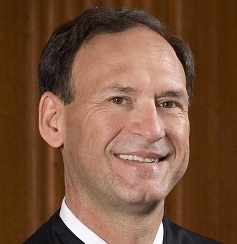By Bob Allen
The U.S. Supreme Court ruled June 30 that the Baptist owners of Hobby Lobby cannot be forced by the government to provide employees with health insurance that covers methods of birth control that they believe cause an abortion.
The 5-4 decision establishes that for-profit corporations can qualify as a “person” in terms of a federal law passed in 1993 to protect individual religious freedoms.
The Religious Freedom Restoration Act, passed with leadership from a broad coalition of groups including the Baptist Joint Committee for Religious Liberty, prohibits the government from “substantially” burdening a person’s exercise of religion without “a compelling governmental interest” and by the “least restrictive means” of furthering that interest.
 Writing for the majority, Justice Samuel Alito said Hobby Lobby owners David and Barbara Green and their three children did not forfeit their right to protection under RFRA when they decided to organize their businesses as corporations rather than sole proprietorships or general partnerships.
Writing for the majority, Justice Samuel Alito said Hobby Lobby owners David and Barbara Green and their three children did not forfeit their right to protection under RFRA when they decided to organize their businesses as corporations rather than sole proprietorships or general partnerships.
While there are 500 Hobby Lobby stores and more than 13,000 employees, Alito said the company remains “closely held,” with members of the Green family retaining exclusive control of both Hobby Lobby and another family business, Mardel.
Hobby Lobby’s statement of purpose commits the Greens to “operating the company in a manner consistent with biblical principles,” including closing all Hobby Lobby stores on Sundays, even though the family estimates it costs them millions of dollars a year in sales.
When the Department of Health and Human Services handed down rules requiring employers to cover preventive services including 20 forms of birth control approved by the Food and Drug Administration, the Greens objected, saying they believe four of the 20 methods can prevent a fertilized egg from implanting and that life begins at the moment of conception.
“If the owners comply with the HHS mandate, they believe they will be facilitating abortions, and if they do not comply, they will pay a very heavy price — as much as $1.3 million per day, or about $475 million per year, in the case of one of the companies,” Alito said. “If these consequences do not amount to a substantial burden, it is hard to see what would.”
Alito said the HHS rules also do not meet the “least restrictive means” standard of achieving the government’s goal of providing women with contraceptive coverage without cost.
“There are other ways in which Congress or HHS could equally ensure that every woman has cost-free access to the particular contraceptives at issue here and, indeed, to all FDA-approved contraceptives,” Alito said.
In fact, he continued, HHS “has already devised and implemented a system” that allows religious nonprofit corporations to object to providing coverage of contraceptives, while ensuring that employees still have access to insurance coverage through a third party.
“HHS has provided no reason why the same system cannot be made available when the owners of for-profit corporations have similar religious objections,” Alito said. “We therefore conclude that this system constitutes an alternative that achieves all of the government’s aims while providing greater respect for religious liberty. And under RFRA, that conclusion means that enforcement of the HHS contraceptive mandate against the objecting parties in these cases is unlawful.”
Hobby Lobby co-founder Barbara Green released a statement hailing the decision as “a victory, not just for our family business, but for all who seek to live out their faith.”
“We are grateful to God and to those who have supported us on this difficult journey,” she said.
Russell Moore, head of the Southern Baptist Ethics and Religious Liberty Commission, called the ruling a win not only for evangelicals like the Greens but for everyone.
“A government that can pave over the consciences of the Greens can steamroll over any dissent anywhere,” Moore said in a blog posted after the ruling. “Whether you agree or disagree with us about abortion, every American should want to see a government that is not powerful enough to set itself up as a god over the conscience.”
Barry Lynn, executive director of Americans United for Separation of Church and State, denounced the decision as a blow to individual conscience and medical privacy rights.
“This decision is a double-edged disaster,” said Lynn, an ordained minister in the United Church of Christ. “It conjures up fake religious freedom rights for corporations while being blind to the importance of birth control to America’s working women.”
“The justices have set a dangerous precedent,” Lynn said. “While the Obama administration may arrange for the government to provide contraceptives, a future administration could easily take that away. In years to come, many women may find their access to birth control hanging by a thread.”
Moore said he hopes the White House will see the decision as a warning “to stop such a cavalier disregard of religious liberty, seen both in this coercive mandate and, earlier, in their argument to do away with the ministerial exemption in hiring.”
